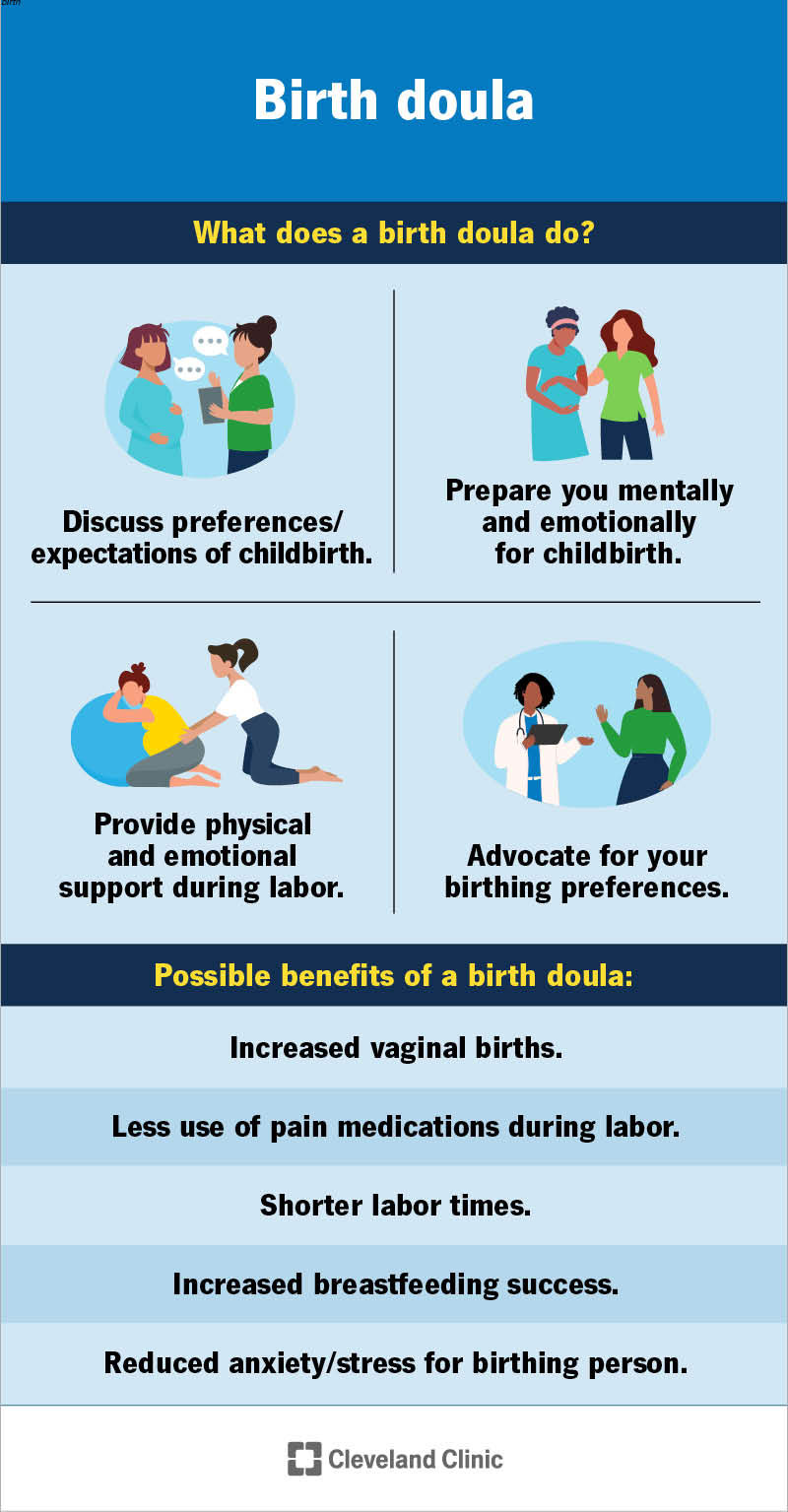A doula is a trained professional who supports you before, during and after you’ve had a baby. Doulas don’t deliver healthcare services, but they do offer physical and emotional support during pregnancy and the postpartum period.
Advertisement
Cleveland Clinic is a non-profit academic medical center. Advertising on our site helps support our mission. We do not endorse non-Cleveland Clinic products or services. Policy

Image content: This image is available to view online.
View image online (https://my.clevelandclinic.org/-/scassets/images/org/health/articles/23075-doula)
A doula is a person who assists you before, during and shortly after childbirth. Doulas aren’t medical professionals, and they can’t deliver your baby. Instead, they complement the care you receive from your healthcare team (like obstetricians, nurses and midwives). Doulas offer physical and emotional support so you can have a positive birth experience. They’re someone who advocates for you and helps you feel empowered, comfortable and cared for. Some people call their doula a birth coach or a birth companion.
Advertisement
Cleveland Clinic is a non-profit academic medical center. Advertising on our site helps support our mission. We do not endorse non-Cleveland Clinic products or services. Policy
Hiring a doula may be a good idea if you’d like someone in your corner whose sole purpose is to support you. A doula can advocate for your birthing preferences (for example, delivery methods and preference for pain relief). They can offer comfort and reassurance during delivery. Doulas can also help once you go home and adjust to life with your newborn.
Doulas offer different services, often based on what they specialize in. But the role of a doula is extremely customizable — they’ll work with you to determine what type of support you need and if they can provide it.
If you’re looking to hire a doula, make a list of things you anticipate needing help with. Some doulas offer a wider range of services than others. For example, some doulas focus primarily on caring for you and your baby, while others will do light housework or run errands for your family.
Birth doulas — also called a labor doula — prepare you for childbirth and provide ongoing support while you’re in labor. Your relationship with your doula often begins in your second or third semester during pregnancy. This type of doula is the most popular type.
Birth doulas:
Advertisement
Pregnancy (or antepartum) doulas assist with pregnancies that require special care and attention. They provide physical and emotional support if you have a high-risk pregnancy, are on bed rest or have unmanageable symptoms, like severe morning sickness. Pregnancy doulas also:
Postpartum doulas assist you in the first few weeks or months after you’ve had your baby. In addition to offering emotional support to help you adjust to life with an infant, postpartum doulas:
Full-spectrum doulas offer support that extends beyond the more traditional role of birth doulas. They offer support across the entire reproductive journey. Full-spectrum doulas may:
There aren’t any laws requiring doulas to be accredited, but most doulas go through training and receive certifications. There are many organizations that offer doula certification. The exact training and certification can vary, but most programs require doulas to:
Support from a doula can improve your childbirth experience during delivery and afterward. Doulas improve healthcare outcomes, too. Research has shown that doula-supported births are associated with:
There are some reasons why people choose not to hire a doula. Some of those are:
Advertisement
The relationship you have with your doula is special and important. A good doula should be knowledgeable, but they should also be someone you like and trust. Ask medical professionals, friends and family members for recommendations.
When you meet with a potential doula, listen to your intuition. Does this person make you feel comfortable? Are you able to express yourself? Do you feel like you “click” with them?
During your initial meeting with a potential doula, ask:
If you’re interested in a doula, start looking for one as soon as possible. Depending on where you live, the demand for doulas could be high. They can only help so many people with similar due dates.
A midwife has medical training that qualifies them to deliver a baby during low-risk births. They can also prescribe medications. Midwives can’t perform surgeries, like C-sections.
Doulas aren’t medical professionals and can’t provide treatment or medical advice. Instead, they’re trained birthing companions that advocate for your physical and emotional needs.
Advertisement
No. A doula can provide support and advocacy during birth. Only a medical professional can provide treatment or deliver your baby.
Many people who work with doulas are glad they received the additional support. Providers also recognize the important work that doulas do. Having a doula attend to your emotional needs in the delivery room can help your care team focus entirely on delivering a healthy baby.
Are you thinking of hiring a doula? A doula’s goal is to make your birth experience as pleasant as possible. They act as your personal advocate, making sure your emotional and physical needs are met. Reach out to people you know and trust for recommendations on doulas in your location. Some doulas specialize in different areas and offer different services. Interview multiple doulas so you find the best fit for you and your family.
Advertisement

Sign up for our Health Essentials emails for expert guidance on nutrition, fitness, sleep, skin care and more.
Learn more about the Health Library and our editorial process.
Cleveland Clinic’s health articles are based on evidence-backed information and review by medical professionals to ensure accuracy, reliability and up-to-date clinical standards.
Cleveland Clinic’s health articles are based on evidence-backed information and review by medical professionals to ensure accuracy, reliability and up-to-date clinical standards.
Cleveland Clinic childbirth experts coach you through every step — from labor to delivery to what to expect when you and your newborn head home.
